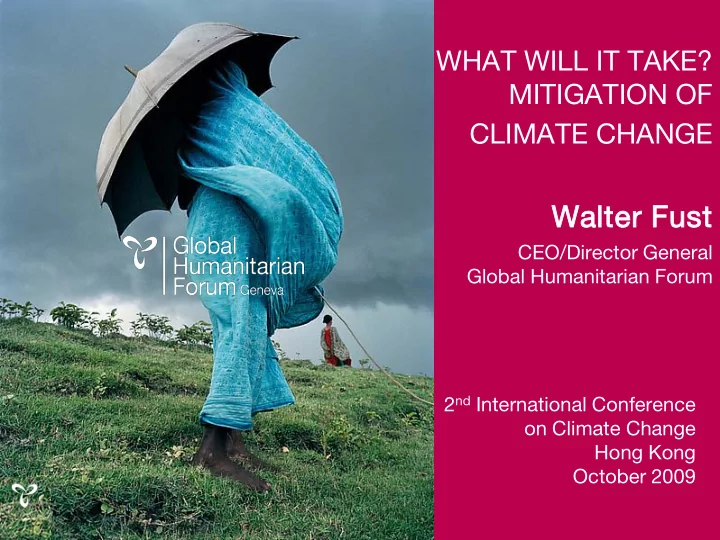

WHAT WILL IT TAKE? MITIGATION OF CLIMATE CHANGE Wa Walt lter Fu Fust CEO/Director General Global Humanitarian Forum 2 nd International Conference on Climate Change Hong Kong October 2009
INCREASE IN STORM AND FLOOD LOSSES COMPARED TO EARTHQUAKES
CLIMATE CHANGE IMPACTS TODAY
CLIMATE IMPACT PROJECTIONS FOR 2030
PEOPLE AFFECTED BY CLIMATE CHANGE
NUMBER OF DEATHS DUE TO CLIMATE CHANGE
THE GROWING IMPACT OF CLIMATE CHANGE
POPULATIONS AT RISK DUE TO CLIMATE CHANGE
CLIMATE VULNERABLE COUNTRIES WORLDWIDE
ECONOMIC LOSSES COMPARED
ASYMMETRIC HUMAN IMPACT
A GLOBAL JUSTICE CONCERN
A GLOBAL CHALLENGE: GOALS MISSED
THREATS TO MILLENIUM DEVELOPMENT GOALS
THREATS TO MILLENIUM DEVELOPMENT GOALS - continued
URGENT MITIGATION • Adaptation has an immediate effect for safeguarding populations • But pollution and mitigation have a delayed effect on the climate • Time slot for mitigation is extremely narrow due to the inertia of the global climate system Global emissions must peak before 2020 to avoid 2°C warming • Global emissions must fall 80% by 2050 •
EXTENSIVE MITIGATION: AN INTEGRATED OPPORTUNITY Mitigation represents a crucial business • opportunity for wealthy and poor countries • Mitigation can support also adaptation and development In Sahel: forest destruction to provide • burning fuel for household needs releases CO2, drives desertification and causes higher incidence of resperatory diseases
ENERGY FOR THE POOR Global energy poverty = 1.6 billion people • Traditional infrastructure and carbon intensive energy solutions are not • well adapted to the needs of rural poor • Decentralized renewable enery solutions, such as solar stoves or lamps, also solve access problems Many climate stressed regions, such as the Sahel are renewable-energy • rich – hence the DESERTEC initiative Addressing energy poverty will improve development progress and climate • resiliance in rural areas – and also slow urbanization by stemming migration flows into urban slums
Recommend
More recommend